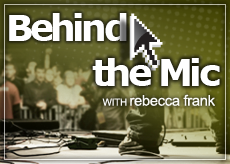Behind the Mic: What's The Deal With Record Deals?
posted in: Features
 There’s no question that the music industry has changed drastically in the past few years. As the power has shifted from the major labels to nearly anyone with Internet access, it’s hard to tell what artists really need to do to get their careers off the ground. After all, it could take years of constant touring, promoting, spending money you don’t have and sleeping in a van to finally get your big break…or you could become a celebrity overnight thanks to YouTube, MySpace and Twitter.
There’s no question that the music industry has changed drastically in the past few years. As the power has shifted from the major labels to nearly anyone with Internet access, it’s hard to tell what artists really need to do to get their careers off the ground. After all, it could take years of constant touring, promoting, spending money you don’t have and sleeping in a van to finally get your big break…or you could become a celebrity overnight thanks to YouTube, MySpace and Twitter.
So, what’s the deal with record deals, anyway? Should you try to get signed on an independent (“indie”) label or a major label? Do you even need one at all?
Indie label Epitaph Records is home to acts such as Weezer and Every Time I Die
In general, indie labels tend to be like small businesses. They typically sign a small number of semi-established acts and have much less funding than a major. Examples of indie labels include Epitaph, Victory, Saddle Creek and Fueled By Ramen. On the other hand, major labels have big budgets and are similar to corporations. They are fast to sign acts with huge followings and many marketable qualities, and can put much more money into their artists’ careers. Examples of major labels include Warner Music Group, Universal Music Group, Sony BMG and EMI.

EMI artist Snoop Dogg
Essentially, in order to know what kind of label you want to be on, you need to figure out who you are as an artist. Try to compile a written plan for your career. What is your genre? Target audience? What are other acts your target audience likes and why? What have those acts done that helped them succeed? Do some shopping and start a list of labels you like that will help you realize your goals. Once you have the list narrowed down, you’ll need to learn how to effectively and appropriately get the attention of A&R executives.
If the idea of being on a record label doesn’t appeal to you, fear not: it is possible to have a successful career as a musician without a label. Let’s not forget that when Radiohead released In Rainbows without a record label and at any price the customer chose, they saw 1.2 million downloads before it was even physically in stores! With so many free outlets available (including OurStage, of course!), more unsigned musicians are able to be discovered without having to send out demos and press kits to add to the growing pile at an A&R’s desk.
Do you need a label? Not necessarily. Ultimately, the choice is up to you. But whether you choose to stay unsigned or try to get signed by a label, always keep your ideal goals in mind and stay true to what makes you unique!
